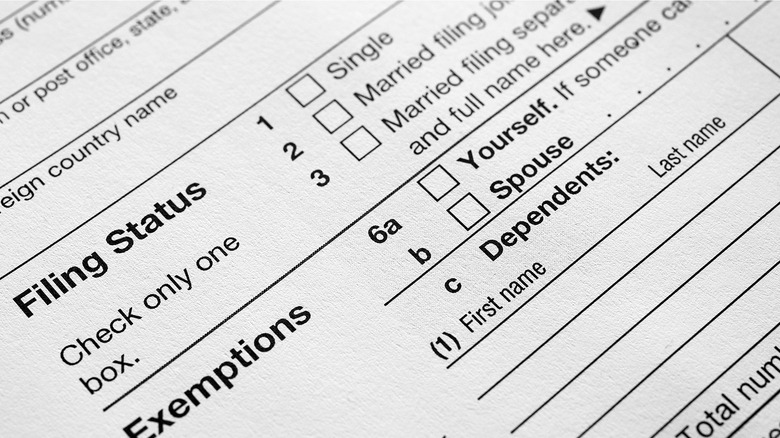How Getting Divorced Affects Your Tax Returns
The statitiscal claim that "half of all marriages end in divorce" may have been closer to the truth at one time, but according to the Centers for Disease Control and Prevention, the number of divorces in the United States is actually on a downward trend, and has been for the last two decades. CDC data says there were 2.5 divorces per 1,000 people in 2021 (based on 45 reporting states and the District of Columbia), compared to four divorces per 1,000 people in 2000. To be exact, in 2021, there were 689,308 divorces versus 944,000 in 2000. With this said, marriages in America are also decreasing. However, for this article, we're just looking at divorces in the U.S., and specifically, how a divorce can affect your tax return.
For divorcing couples, there are myriad things to figure out, discuss, and agree to, and while you likely aren't thinking about it right this minute, the decisions you and your former spouse make upon the dissolution of your marriage will have a major impact on your taxes going forward. When you divorce, the divorce decree the court approves will provide you and your ex with a guide on how to file your taxes for the current and subsequent years. As USA.gov explains, "A divorce decree is a court order ending a marriage." This court document outlines the terms of the divorce, all of which will have tax implications, from the division of your assets and debts to alimony payments to the custody, visitation, and financial support of the children.
Tax filing status after divorce
When it comes to divorce and taxes, the first question a former couple will face is filing status. If your divorce didn't happen until the new year, then you could still file jointly one more time (if both agree) and benefit from the greater standard tax deduction. For 2023 tax returns (filed in 2024), the standard deduction is $13,850 for single filers, $20,800 for heads of households, and $27,700 for taxpayers who file jointly. To file a joint return as a divorced/ing couple, you must have still been married on or before December 31 of the tax year you're filing a return for.
If your divorce was finalized before December 31, then your filing status will, yes, be as a single filer, and you can refer to your divorce decree to determine how assets and debt should be reported. For instance, mortgage interest can be split between exes if both are still paying it equally. Or, if you sell the home (and it was your primary residence), and file separately, you can each exclude up to $250,000 in profits gained from the sale. Note, if you file jointly, this goes up to $500,000.
Finally, if you're filing as a single filer, you could file as a head of household and get the greater standard deduction if you meet three IRS requirements: 1) You and your former spouse didn't live together for the last six months of the tax year, 2) You paid more than half the cost to maintain the home, and 3) Your home was the main residence for a dependent child for more than six months.
Claiming dependents on tax returns
If you've been awarded custody, then you could claim the child/ren as dependent/s on your taxes, which could qualify you for certain tax credits that can help reduce your tax liability, depending on your how much you earn. These include the earned income tax credit, the child tax credit, and the child and dependent care credit. For example, for taxpayers claiming the child tax credit, they can receive up to $2,000 for every qualifying dependent under the age of 17.
For former spouses who share custody 50/50, the IRS says that the parents need to decide on who gets to claim their child as a dependent on their taxes. When deciding, one factor may be income or who contributes more financially while the child is in their care, like, say, the child participates in more clubs/sports while living with one parent during the year.
The noncustodial parent cannot claim any of the tax credits of the custodial parent, starting with filing as a head of household. However, the custodial parent could sign Form 8332 for the tax year, which would allow the noncustodial parent to claim their child as a dependent, and thus qualifying them for the child tax credit. Once signed, the release cannot be revoked until the next tax year.
Are alimony and child support taxed?
Another tax implication of divorce concerns alimony and/or child support. Should alimony and/or child support be reported as income on a tax return, and can the payee deduct payments from their taxes? When it comes to federal taxes, the answer to both today is no; according to the IRS, neither alimony or child support is considered taxable income and neither can be included in one's income tax deductions.
Prior to 2019, this wasn't the case, but the Tax Cuts and Jobs Act (TCJA) of 2017 changed the tax rules, making both alimony and child support payments nondeductible. As for alimony payments, the IRS explains that any alimony payments received from a divorce decree/agreement executed after December 31, 2018, aren't taxable. This also applies to any agreements modified after this date.
When filing taxes, keep in mind that these tax rules on alimony and child support apply to federal income tax returns. Those living in states where you file state income tax returns, check to see how your tax rules may be different. For example, in California, alimony payments are still reported as taxable income, and the payee can deduct the payments on their return. However, child support is considered tax-neutral, and, as with federal taxes, isn't subject to tax by the state.



